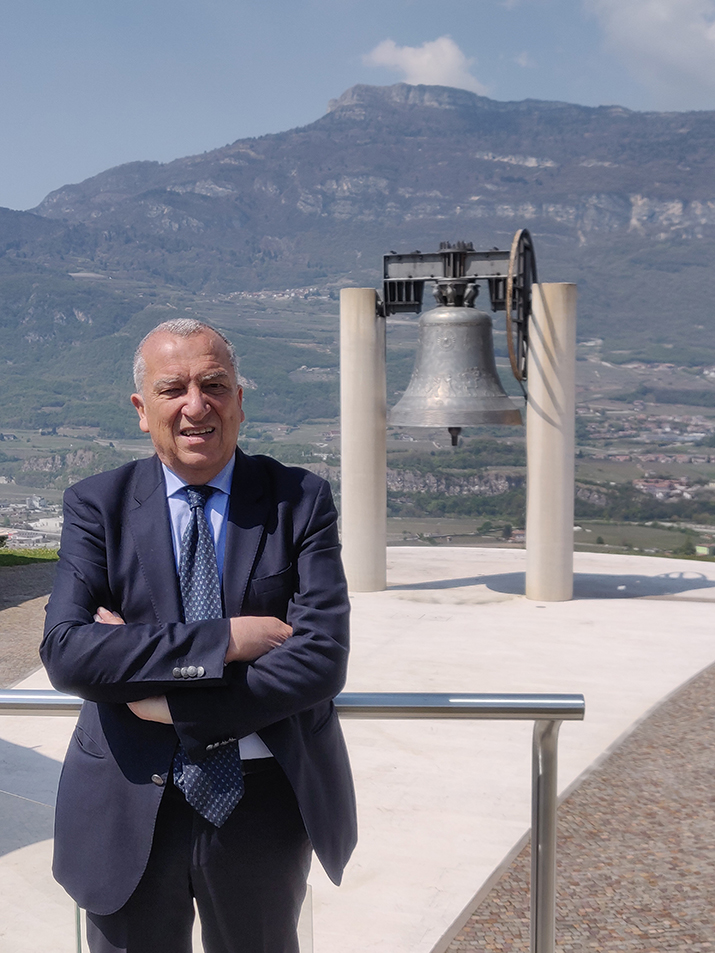At the Colle di Miravalle two flags have made their appearance fifteen years apart from each other.
First, in 1975, that of the State of Israel, on the occasion of an international ceremony in memory of the fallen of all wars. Second, in 1990, that of Palestine, officially raised during the visit of the then Minister of the "Authority", Ziad Ali Khalil AbuZayyad.
Since those dates, the Bell of the Fallen has welcomed delegations and hosted events promoted by both. To mention a few, a celebration of Yom HaShoah (with which the victims of the Holocaust are honored) and a concert by the famous singer Noa from the Israeli side with the visit of the Mayor of Beit Jala, a town in the West Bank as an example of successful civil and religious coexistence from the Palestinian side.
Nobody pretends to say that in relation to our Foundation, the much-invoked principle of "two peoples and two states" has already been applied. At the same time, in a period in which the troubled geographical area has once again resulted in a scene of conflict culminating in a high number of victims, any positive symbolism, however minor, may serve to contradict the judgment of the disconsolate British diplomat according to whom "never in the history of humanity have so much time and effort been devoted to a peace process, obtaining so few results in return".
This is certainly not the moment to deal with the historical reconstruction of decades of armed conflicts, interspersed with numerous attempts at intermediation by the United Nations and other multilateral organizations, promptly thwarted by subsequent clashes and violence.
In summary, the assessment recently reaffirmed by the President of the Foreign Affairs Commission of the Chamber of Deputies appears to be fully acceptable, regarding the extreme difficulty in reconciling "two rights" and not, as happens in other crisis situations, "a right and a wrong position".
In this second case, the "corrective" measures of the international community would logically be directed towards the party at fault, to induce it to withdraw from unacceptable behavior.
But, in concrete terms, how can you mediate Israel's right to provide security of its citizens quickly and effectively with the right of the Palestinian people to form an independent state entity?
Two objectives, fully legitimate, today rendered impossible by almost insurmountable obstacles. On the one hand you have the Hamas statute contemplating the destruction of the Jewish state and on the other hand, the deliberate, massive settlement policies promoted by Tel Aviv in areas historically destined for the establishment of the Palestinian state.
At the beginning of the 90s with the Madrid Conference and the Oslo Accords, ratified in Washington by Rabin and Arafat under the smug gaze of Bill Clinton, the aspiration of one side to live in safety and of the other to obtain a homeland had seemed closer than ever to realization. In retrospect, it must be admitted that it was due more to a combination of favorable factors (including the interpersonal aspect) than a convinced sharing of paths and objectives. Today the Israeli government, which has faced four elections in two years, is desperate for stability, to which the presence of an Arab party and the absence of representatives of religious movements could hopefully contribute, within the new variegated government coalition. On the other hand, concern is raised by the fact that the decline of the "moderate" Abu Mazen is accompanied by the growing consensus reported, especially among the younger generations, by the messages of Hamas and by the unequivocal terrorist matrix.
In order to overcome this impasse and to promote the necessary stability, a decisive and broader mobilization of the international community is an absolute necessity, capable of involving not only the United States and European countries but also, through the Arab League, the countries of the area. Through the recent "Abraham Accords" - one of the few positive legacies of the Trump administration – a number of these states (United Arab Emirates and Bahrain) have entered into formal relations with Israel, but at this point it appears essential to convince more radical supporters adopting a position of ostracism of the need for negotiations (primarily Iran, Saudi Arabia and Syria among others).
According to reports from the area, a further, small encouraging sign of willingness to dialogue seems to come from below, from the two communities, through the increasingly widespread appearance in public places inhabited by Israelis and Palestinians of the words both in Arabic and Hebrew, "we only have this house, let's live in it together".
While waiting for events to unfold, it is certain that the flags of the State of Israel and State of Palestine will continue to coexist peacefully at the Miravalle Hill. It is our hope that the one hundred daily chimes of "Maria Dolens" will favor the spread of this reassuring image of coexistence in other geographical settings, helping to ensure that today's exception becomes tomorrow's rule as soon as possible.
"Reggente" Marco Marsilli, Foundation President







